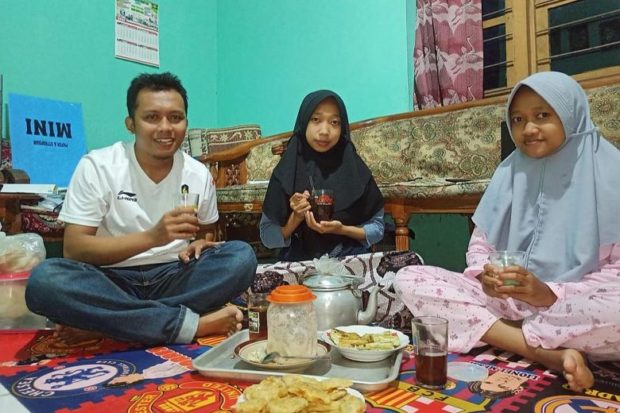Fasting under lockdowns: Quieter Ramadan in Indonesia but some keep traditions alive

Central Java resident Tri Wicaksono breaking fast with his wife (right) and sister-in-law last Saturday. Because of Covid-19, he has been avoiding crowded places. PHOTO: COURTESY OF TRI WICAKSONO via The Straits Times
JAKARTA — In the wee hours last Friday, the first day of Ramadan, a group of youth ambled through their village in Sukabumi, West Java, to wake their neighbors for sahur, the last morning meal before their fast from dawn to dusk.
Hitting bamboo cylinders, pails and biscuit tins with sticks, they hollered: “Sahur! Sahur!”
The tradition remains during the Muslim fasting month in many parts of Indonesia, despite the coronavirus pandemic which has killed over 700 people and is spreading rapidly across the country.
“This tradition must be preserved as it is the legacy of our ancestors,” said groupleader Ari Hamdani, 23, in a video on Tribunnews.com website. “Yes, we are scared of the coronavirus, but we shouldn’t get too hung up on fear. Instead, we should bring warmth to our village. After all, waking people up is also part of worship,” he added.
In the world’s most populous Muslim-majority country where over 90 per cent of its 270 million people are of the faith, Ramadan is as much about socializing as it is about worship. Indonesians typically participate in congregational nightly prayers, known as terawih, at mosques, breaking-of-fast gatherings or bukber or buka bersama, and giving free predawn meals to the poor and homeless, known as sahur on the road.
Article continues after this advertisementChildren blast firecrackers into the night, while adults hunt for the best snacks and desserts, known as tajil, to serve at the dinner table.
Article continues after this advertisementAnd as the end of Ramadan nears, millions living abroad and in the Indonesian capital, Jakarta, will make the annual return to their home towns, known as mudik, to celebrate Hari Raya Aidilfitri. More partying ensues – from home-cooked feasts to visits to the homes of friends and relatives.
But the fear of spreading the virus to larger communities has led the government and Muslim groups to launch appeals to do away with the rituals and keep most activities indoors. The mudik has been banned, with all commercial international and domestic flights and sea travel halted until early June.
Indonesia has not opted for a national lockdown. Instead, regional administrations can apply for a permit from the health minister to implement strict social distancing measures in their localities. So far, two provinces and 22 cities or districts have received the green light, with Jakarta being the first.
In these places, the Ramadan mood is more sombre as many mosques have been shut and prayers and gatherings suspended.
In Jakarta, the epicenter of the virus outbreak in the country, bank operations manager Ferry Husni, 49, said he has not visited his parents for fear of potentially infecting them with the virus. “We always visit our parents at the start of the fasting month, and this is the first time we are not doing so. We are still thinking about whether we should visit them on Hari Raya,” he told The Straits Times.
“The mood is very different. There are no crowds anywhere any more. We can’t meet people, the malls are closed. We all just try to enjoy ourselves at home,” he added.
In Klaten regency, in Central Java, Mr Tri Wicaksono, 28, said he and his neighbors have decided to do away with their annual spring-cleaning of the nearby mosque as a precautionary measure.
“There’s something missing. It’s like a cook lacking salt,” he told ST, adding that he still performed the terawih prayer at the mosque.
But the session was shortened to 40 minutes, instead of the usual one hour, and attended by only 100 worshippers, a quarter of the usual crowd. Worshippers stood a meter apart and did not shake hands.
Mr Tri said he, his wife and four-month-old baby will not attend the carnival-like street parade on the eve of Hari Raya in nearby Yogyakarta: “We will likely just stay here. Yogyakarta is a red zone now.”
With a circular issued by the Religious Ministry barring various activities including takbir keliling, a traditional parade where Muslims shout praises to Allah on Hari Raya Eve, it remains unclear if the Yogyakarta city administration will scrap the parade this year.
In contrast, in Aceh, the deeply religious western-most province dubbed Indonesia’s Verandah of Mecca – as it was where Islam first spread to the region and where Indonesians boarded ships bound for the holy city – several thousand worshippers thronged the biggest mosque in the provincial capital Banda Aceh for terawih.
It may be distressing times, but there is no dampening of spirits.
Property businessman Dudy Koestoro said he could now enjoy breaking fast with his family again, without other social distractions.
“My daughter, who studies in Bandung (capital of West Java), is always at home now. This coronavirus makes us stick together more as people break their fast at home,” he said.
There is also a hive of activity on social media as Indonesians change their rituals including waking up their family for sahur online.
In a Tiktok video posted by user kukubima_8101, a girl in a grey Muslim headscarf enthusiastically beats the tabla as she belts out a melodious rendition of the all-too-familiar Sahur! Sahur!
For more news about the novel coronavirus click here.
What you need to know about Coronavirus.
For more information on COVID-19, call the DOH Hotline: (02) 86517800 local 1149/1150.
The Inquirer Foundation supports our healthcare frontliners and is still accepting cash donations to be deposited at Banco de Oro (BDO) current account #007960018860 or donate through PayMaya using this link.